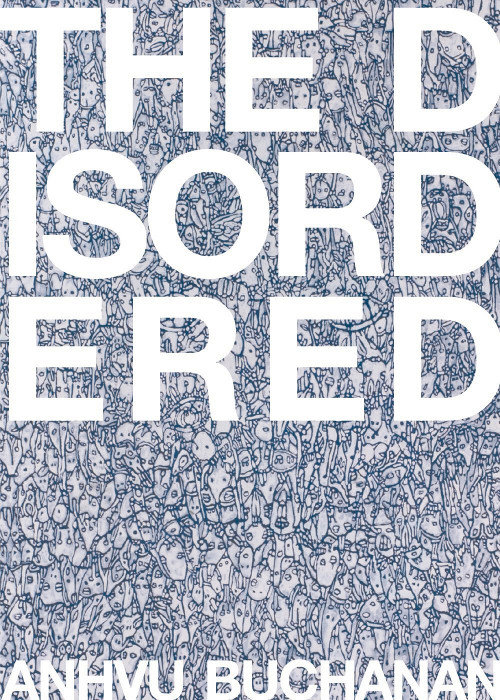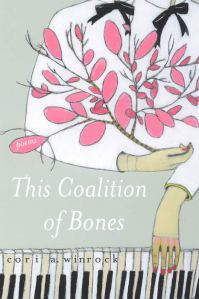Posted by Lucia LoTempio, Managing Editor for 3.1
If you are looking for some hot and fresh new collections, here is a bright start! These books sing, they push boundaries, and are a decidedly fitting way to spend the long humid summer months. Not to mention these collections are current—nothing before last year for you, Gandy fans.
The Disordered by Anhvu Buchanan
from sunnyoutside
 The first collection from Buchanan, he explores madness and it’s categorization, relegating all titles to an appendix in the back. He pushes the boundary of what is insanity and how we label it. Buchanan intelligently utilizes format, especially in his stream of conscious poems, like in “Sweet Nothings of a Paraphiliac Couple,” which opens with “don’t call me baby unless you’re ready to get sexy / with my saxophone when I say honey bunny I mean / your feet are looking deliciously vulnerable / tonight.” I mean, come on—you can’t tell me you don’t want to read that poem.
The first collection from Buchanan, he explores madness and it’s categorization, relegating all titles to an appendix in the back. He pushes the boundary of what is insanity and how we label it. Buchanan intelligently utilizes format, especially in his stream of conscious poems, like in “Sweet Nothings of a Paraphiliac Couple,” which opens with “don’t call me baby unless you’re ready to get sexy / with my saxophone when I say honey bunny I mean / your feet are looking deliciously vulnerable / tonight.” I mean, come on—you can’t tell me you don’t want to read that poem.
TwERK by Latasha N. Nevada Diggs
from Belladonna
 There is no other way to think of TwERK, but as a masterpiece of language. Diggs is disciplined in her speakers’ chaos, identifying how hegemonic forces portray other languages as “less than” to subjugate its people—and works vigorously (and successfully) against this. Every word serves a purpose—not to mention each word could be in a multitude of different languages or veniculars. And she knows when her readers need translations and when it would be better to leave them in the dark, strategically vacillating between isolation and inclusion. She also skillfully meshes tradition with pop culture using cadence and musicality that will make you feel, make you want to dance. In TwERK, you see a section of what I would call translation erasures, melding the tradition of kantan chamorritta with Dr. Seuss, to an ode to Suri Cruise, to speakers in direct conflict, one telling the other, “Popo, here’s your “black mammy” / multi-platinum crowd pleaser, / destroyin’ daisy cutters like legend of the Overfiend skeezas.”
There is no other way to think of TwERK, but as a masterpiece of language. Diggs is disciplined in her speakers’ chaos, identifying how hegemonic forces portray other languages as “less than” to subjugate its people—and works vigorously (and successfully) against this. Every word serves a purpose—not to mention each word could be in a multitude of different languages or veniculars. And she knows when her readers need translations and when it would be better to leave them in the dark, strategically vacillating between isolation and inclusion. She also skillfully meshes tradition with pop culture using cadence and musicality that will make you feel, make you want to dance. In TwERK, you see a section of what I would call translation erasures, melding the tradition of kantan chamorritta with Dr. Seuss, to an ode to Suri Cruise, to speakers in direct conflict, one telling the other, “Popo, here’s your “black mammy” / multi-platinum crowd pleaser, / destroyin’ daisy cutters like legend of the Overfiend skeezas.”
This Coalition of Bones by Cori A. Winrock
from Kore Press
 If you are desperately looking for short line done right, cue the gospel choirs singing alleluia because you have found it in Cori A. Winrock’s first book. These poems are gorgeous with a healthy dose of creep. It is nothing short of a scientific exploration of systems of being, from the body to suburbia—there is nothing too little or too big to be examined. One section boasts the Seven Sins of Memory, as coined by Daniel Schacter (I can’t help myself and have to link you to the full version of one of them, “[Bias 1]: Singular Orphic Selves”), while another sonnets about the suburbs. Winrock’s poem are as much compact as they are complex—each maintains a sense of permanence with exact language and image.
If you are desperately looking for short line done right, cue the gospel choirs singing alleluia because you have found it in Cori A. Winrock’s first book. These poems are gorgeous with a healthy dose of creep. It is nothing short of a scientific exploration of systems of being, from the body to suburbia—there is nothing too little or too big to be examined. One section boasts the Seven Sins of Memory, as coined by Daniel Schacter (I can’t help myself and have to link you to the full version of one of them, “[Bias 1]: Singular Orphic Selves”), while another sonnets about the suburbs. Winrock’s poem are as much compact as they are complex—each maintains a sense of permanence with exact language and image.
Motherland Fatherland Homelandsexuals by Patricia Lockwood
from Penguin
 Okay it’s time to ignore all the critics who are asking the dickish question, “But, like, is she too internet famous?” because Lockwood’s second book is killer. Decidedly weird, decidedly thoughtful, it will make you laugh out loud, it will make you want to spit on the status quo, it will make you want to thief each poemscape for yourself. Her titles, like “Last of the Late Great Gorilla-Suit Actors” or “Factories are Everywhere in Poetry Right Now” or “The Father and Mother of America Tit-Pics,” are unexpected, clever, and most importantly fitting. She does not care for shock value just for the sake of it, and in fact recognizes the inevitable leaning of critics to think she would—her speakers are consistently self-aware. Her images are sharp and her language is on point in this challenge of societal roles of gender and sexuality.
Okay it’s time to ignore all the critics who are asking the dickish question, “But, like, is she too internet famous?” because Lockwood’s second book is killer. Decidedly weird, decidedly thoughtful, it will make you laugh out loud, it will make you want to spit on the status quo, it will make you want to thief each poemscape for yourself. Her titles, like “Last of the Late Great Gorilla-Suit Actors” or “Factories are Everywhere in Poetry Right Now” or “The Father and Mother of America Tit-Pics,” are unexpected, clever, and most importantly fitting. She does not care for shock value just for the sake of it, and in fact recognizes the inevitable leaning of critics to think she would—her speakers are consistently self-aware. Her images are sharp and her language is on point in this challenge of societal roles of gender and sexuality.
The Big Smoke by Adrian Matejka
from Penguin
 I didn’t think I could fall in love with a book about the heavy weight world champion of the early 20th century, Jack Johnson—but I did, and let me tell you I fell hard. This collection is historical, telling a story while taking on multiple perspectives to give new life to this man. In fact, what I respect most about this collection is its loyalty to truthfulness while maintaining an exploration through fictionalizing thoughts and conversation—and its interest in multiple voices to portray a complex and not entirely praise-worthy man, especially through the development of his wife Etta’s depiction of him. From her exaltation: “Beautiful man, / mi amore. He shines like Lake / Michigan in July heat. He heats / me up: a black dress on a sunny / day” in “Photography,” to wanting to shoot him like a duck if she had a gun in “Aristocracy.” Matejka truly embraces the “project” collection, formatting some poems as newspaper interviews, at times using direct quotes, letters, and even sectioning one poem as rounds in a boxing match.
I didn’t think I could fall in love with a book about the heavy weight world champion of the early 20th century, Jack Johnson—but I did, and let me tell you I fell hard. This collection is historical, telling a story while taking on multiple perspectives to give new life to this man. In fact, what I respect most about this collection is its loyalty to truthfulness while maintaining an exploration through fictionalizing thoughts and conversation—and its interest in multiple voices to portray a complex and not entirely praise-worthy man, especially through the development of his wife Etta’s depiction of him. From her exaltation: “Beautiful man, / mi amore. He shines like Lake / Michigan in July heat. He heats / me up: a black dress on a sunny / day” in “Photography,” to wanting to shoot him like a duck if she had a gun in “Aristocracy.” Matejka truly embraces the “project” collection, formatting some poems as newspaper interviews, at times using direct quotes, letters, and even sectioning one poem as rounds in a boxing match.
Extra Credit:
If One of Us Should Fall by Nicole Terez Dutton
from University of Pittsburgh Press
 Okay so this book didn’t come out in the past year, BUT something about it makes me want to read it exclusively in the summertime. The poem that I always go back to is “Recurrent Dream of Constant Falling.” Jam-packed with image and musicality, her speaker talks about “electric-blue hydrangeas” as “a snowcone of tiny flowers carried like a torch through / a crowd streaming from the subway’s mouth.” The collection is lyrical and challenging, sensual and full of heat, it aims to define while recognizing that nothing truly can be defined.
Okay so this book didn’t come out in the past year, BUT something about it makes me want to read it exclusively in the summertime. The poem that I always go back to is “Recurrent Dream of Constant Falling.” Jam-packed with image and musicality, her speaker talks about “electric-blue hydrangeas” as “a snowcone of tiny flowers carried like a torch through / a crowd streaming from the subway’s mouth.” The collection is lyrical and challenging, sensual and full of heat, it aims to define while recognizing that nothing truly can be defined.
